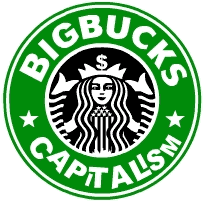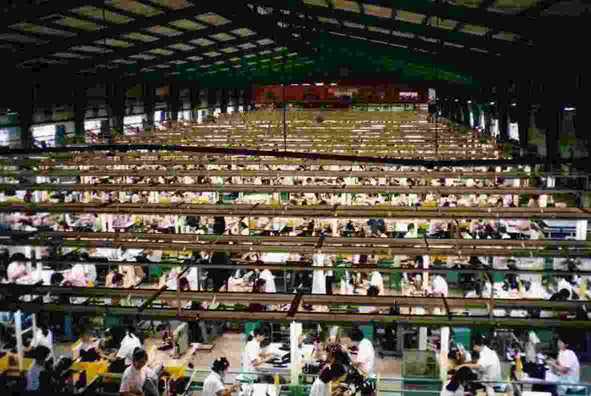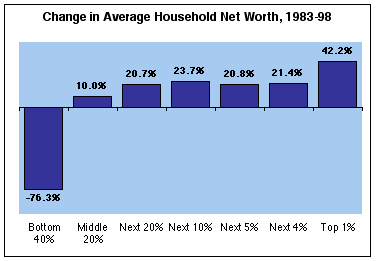
Back to Americans For Morality Home Page
Economic Morality
 Explaining the morality of money to Americans can be difficult. Most Americans don't speak the language of high finance, let alone understand the tax code. There are so many ways to be immoral about money that most Americans cannot understand why something might be immoral without an advanced degree in economics. The more intelligent one gets about money, the more ways one knows how to be immoral.
Explaining the morality of money to Americans can be difficult. Most Americans don't speak the language of high finance, let alone understand the tax code. There are so many ways to be immoral about money that most Americans cannot understand why something might be immoral without an advanced degree in economics. The more intelligent one gets about money, the more ways one knows how to be immoral.
This website cannot possibly discuss all of the ways one can be economically immoral. However, we can discuss the basic ideas of how our economy works, how it evolved, and more importantly the basic differences in philosophy between Republicans and Democrats regarding money.
As normal Americans who don't study the economy, we often allow our eyes to glaze over whenever we hear complicated jargon and vocabulary regarding money. As long as there is food in the supermarket and the malls are open, many (if not most) Americans are satisfied to allow other people to take care of the complexities of our economy. Unfortunately, this attitude can get us into trouble. You see, we have the right to vote. If we don't understand the basic economic philosophies we are voting for, we might be voting for something immoral and not know it. If we rob a bank we end up with money. We are excited to have the money, but the immorality is in how we obtained that money and who got hurt in the process. If we as Americans only care that the trains run on time, or that we are able to consume what we want when we want to consume it, then we are immoral as well. That may be a bitter pill to swallow, but it is one we must swallow in order say that we are really moral voters.
What is Capitalism?
 In order to help you understand the basics of our economy you must understand what capitalism really is. Capitalism today is very different that it was when our country began. In the beginning, men like Adam Smith and John Locke believed in true capitalism which was based on people receiving an amount equal to their labor. In other words, a man running a blacksmith shop would perform a labor, then receive the value of that labor in goods or money. Certainly supply and demand came into play. When there was too many blacksmiths, the price would go down and when more people needed blacksmiths, the price would go up (or the value of his service would increase). These were the old days and they were much simpler.
In order to help you understand the basics of our economy you must understand what capitalism really is. Capitalism today is very different that it was when our country began. In the beginning, men like Adam Smith and John Locke believed in true capitalism which was based on people receiving an amount equal to their labor. In other words, a man running a blacksmith shop would perform a labor, then receive the value of that labor in goods or money. Certainly supply and demand came into play. When there was too many blacksmiths, the price would go down and when more people needed blacksmiths, the price would go up (or the value of his service would increase). These were the old days and they were much simpler.
Modern Capitalism began probably in 1771 when Richard Arkwright created our first true factory system. He hired large families and 2/3 of the workers were children some as young as 6 years old. The people were impoverished and were willing to let their children work to keep from starving.
Arkwright was so successful that he put all private business owners out of business because they could not compete. At about this time, we saw the beginning of people being paid wages for their labor. People began working for other people for a wage instead of working for themselves. This separated capitalism into two big pieces. One was the "product market" and the other was a "labor market." In other words, labor itself became a commodity--something that can be bought and sold and also something influenced by its own supply and demand. This was completely separate from the actual product being produced by the workers. Labor also became market-driven and not just products. Capital, the foundation of Capitalism, ceased being simply about the value of a product but began new life which included the value of labor.
 This is important for moral Americans to understand because it is the foundation of how we get everything that we get in America. Today, the kind of capitalism we practice is now called wage-labor capitalism. People no longer receive the "fruits of their labor" in fact, people are no longer judged based on how good the product of their labor is, but rather how that labor compares to other workers in the labor market.
This is important for moral Americans to understand because it is the foundation of how we get everything that we get in America. Today, the kind of capitalism we practice is now called wage-labor capitalism. People no longer receive the "fruits of their labor" in fact, people are no longer judged based on how good the product of their labor is, but rather how that labor compares to other workers in the labor market.
Capital means that you don't own products any more, but rather you own property--and not just any property. Owning capital means owning the means to produce or owning property that can increase in value on its own without any labor on your part. Businesses make their money from the difference between the value of labor and the wages paid to laborers. The workers cannot get paid the value of their labor. If they did, the capitalist (the owner of the company) would not make a profit. His only interest is to make money by not working. In other words, his interest is in owning the "means" to produce a product, not simply in owning the product itself.
One example would be buying a house. You can actually do nothing to improve the house but make money off of it because of factors such as who moves into the neighborhood, which roads were improved, how good the schools are, or how difficult it is to find other houses. You do no labor, but you make a profit of merely owning the property.
 When you separate the cost and the value of labor, you create all kinds of problems. For example, how often do you hear people talking about "free trade?" What people do not generally know today in America is that the corporations clamoring for free trade in other countries are not talking about the free exchange of products in the product market. If it were so, free trade could be a great thing. Instead, what these corporations are speaking about is the free trade of the "labor market" that we have been discussing. This means that companies want to be able to increase that profit margin by using people in other countries who will work cheaper than Americans. This is called outsourcing. Not only does this produce cheaper labor, it is often akin to slave labor. Many of the people work in sweat shops all day, as do their children, in the same way we used to in America before we created labor laws. This allows corporations to get around or circumvent these laws to make greater profit. As a result, American workers compete with workers in other countries that are deprived of what we consider to basic human rights.
When you separate the cost and the value of labor, you create all kinds of problems. For example, how often do you hear people talking about "free trade?" What people do not generally know today in America is that the corporations clamoring for free trade in other countries are not talking about the free exchange of products in the product market. If it were so, free trade could be a great thing. Instead, what these corporations are speaking about is the free trade of the "labor market" that we have been discussing. This means that companies want to be able to increase that profit margin by using people in other countries who will work cheaper than Americans. This is called outsourcing. Not only does this produce cheaper labor, it is often akin to slave labor. Many of the people work in sweat shops all day, as do their children, in the same way we used to in America before we created labor laws. This allows corporations to get around or circumvent these laws to make greater profit. As a result, American workers compete with workers in other countries that are deprived of what we consider to basic human rights.
Also, the top executives and CEOs of these corporations have shockingly raised their "salaries" over the past 25 years. In 1980 the average corporate executive was paid about 42 times the salary of the average employee. In 2000 that figure had increased to 500 times the compensation of the average employee. (see http://www.faireconomy.org/research/CEO_Pay_charts.html) These CEOs generally own stock in their companies which, as discussed above, represents the real value of the labor produced by the employees or the means of creating that value. Again this all means that property owners are the sole monetary beneficiaries of socially created value. These kinds of capitalists, by definition, take advantage of work that other people do, and they are, through law, entitled to the value added to property by other people.
In the Reagan era, we used to hear the words "trickle down" to explain how we need to not tax the rich because that will free up money to employ more people. Supposedly, money was supposed to "trickle down" to the lowly employee. Unfortunately, the truth is just the opposite. Wages may trickle down but capital trickles up. Remember that wages do not equal capital. The truth in America now is that, under the present kind of wage-labor capitalism, that capital is being consolidated among smaller and smaller groups of people. Companies consolidate and own larger amounts of capital.
Take a look at this chart and see how this has affected America:
(Source: Edward N. Wolff, "Recent Trends in Wealth Ownership, 1983-1998,"
Levy Institute Working Paper No. 300, Table 3. Levy Economics Institute: April, 2000)
Or look at who really owns America with this chart:
(Source: Arthur B. Kennickell, "A Rolling Tide: Changes in the Distribution of Wealth in the U.S., 1989-2001,"
Table 10. Levy Economics Institute: November, 2003)
The more money one has in America, the easier it is to get capital and make more money earned by other people. As a result, it becomes more and more difficult for the poor to get any capital. As the saying goes, "The rich get richer and the poor get poorer." That is wage-labor capitalism in a nutshell.
What has happened now through the creation of huge stores like Wal-Mart, is that enormous power has been consolidated into a few powerful hands.
Here's one way it works:
1. Walmart rents shelf space to companies that outsource or buy from foreign companies that use sweatshops.
2. As a result, they can sell products for less.
3. They come into a community and put independent Americans out of business.
4. If they can't match a price of an independent businessman, they lower the price below the wholesale of that specialty item that the small businessman sells and then Wal-mart eats the cost with the profits off of the other items it sells.
5. This puts the American independent businessman out on the street.
(Check out Walmart Watch at http://walmartwatch.com/home/pages/issues)
 Or take American factories: (Remember Flint, Michigan and G.M.?)
Or take American factories: (Remember Flint, Michigan and G.M.?)
1. They move into town
2. They mistreat the workers
3. The workers unionize or demand fair treatment and pay.
4. The company moves to another country and hires sweatshop workers.
5. The town is decimated.
Or take the government:
1. Since elections are run with money, government officials that support these corporations are the ones elected to public office.
2. They create more laws that support outsourcing (in the name of "free trade).
3. Public schools stop teaching children to be creative and instead teach them how to "get a job," "enter the labor force, " or "become an employee." The schools begin supporting the needs of the growing corporations and teach children to be come wage-earners rather than true capitalists or self-employed businesspersons.
4. This increases the power of the corporations.
Because of competitive wage-labor, America no longer practices true capitalism. True capitalism means that Americans receive the value of their labor.
We must solve the problem or our economy will fail. How do we solve the problem? We have to return power to the people. People need to share stock in the companies they work for. They need to support equal standards of labor between labor partners in the world. Taxes, under the present system must be gradated upward toward the wealthy and capital must be taxed more than labor. If the system, were a true capitalist society, a flat tax would be fine. But under the present system, a flat tax only serves the wealthy few. Is this gradation a type of income redistribution? It certainly is. But under the current system, it is necessary. This is why Republicans like to call Democrats socialists. But in reality, thy are actually true capitalists because they demand that you get paid the value of your labor or at least a fairer portion that will keep the disparity between the rich and poor at levels that are not pulling away from each other exponentially. Remember, this has nothing to do with how hard a laborer works. It's all about the value of labor markets. The goal of Democrats is not to reward those that choose not to work.
Democrats are worried about the fiscal future of this nation. Do you believe in fiscal responsibility? What about our national deficit and debt? (check out the national debt clock at http://www.brillig.com/debt_clock/). Are you aware that George W. Bush has created the highest annual deficits in the history of this nation? Are you also aware that we had deficit surpluses under the previous Democratic administration? So who is really for "big government" and how moral is our spending?
As you see, even basic economics is complex for most Americans. But if you do not even understand the basics of your own economy, how can you hope to cast a moral vote in the next election? Will you vote for outsourcing, slave labor, more debt, more Enrons, corporate control of elections, or more disparity between the rich and poor? Or will you vote to allow all Americans to own a piece of America? Owning a piece of it means we will take care of it, be proud of it, and increase its value more than we would if we were simply "renters" of the American dream.
Back to Americans For Morality Home Page
Links and Further Reading


 Explaining the morality of money to Americans can be difficult. Most Americans don't speak the language of high finance, let alone understand the tax code. There are so many ways to be immoral about money that most Americans cannot understand why something might be immoral without an advanced degree in economics. The more intelligent one gets about money, the more ways one knows how to be immoral.
Explaining the morality of money to Americans can be difficult. Most Americans don't speak the language of high finance, let alone understand the tax code. There are so many ways to be immoral about money that most Americans cannot understand why something might be immoral without an advanced degree in economics. The more intelligent one gets about money, the more ways one knows how to be immoral.  In order to help you understand the basics of our economy you must understand what capitalism really is. Capitalism today is very different that it was when our country began. In the beginning, men like Adam Smith and John Locke believed in true capitalism which was based on people receiving an amount equal to their labor. In other words, a man running a blacksmith shop would perform a labor, then receive the value of that labor in goods or money. Certainly supply and demand came into play. When there was too many blacksmiths, the price would go down and when more people needed blacksmiths, the price would go up (or the value of his service would increase). These were the old days and they were much simpler.
In order to help you understand the basics of our economy you must understand what capitalism really is. Capitalism today is very different that it was when our country began. In the beginning, men like Adam Smith and John Locke believed in true capitalism which was based on people receiving an amount equal to their labor. In other words, a man running a blacksmith shop would perform a labor, then receive the value of that labor in goods or money. Certainly supply and demand came into play. When there was too many blacksmiths, the price would go down and when more people needed blacksmiths, the price would go up (or the value of his service would increase). These were the old days and they were much simpler.  This is important for moral Americans to understand because it is the foundation of how we get everything that we get in America. Today, the kind of capitalism we practice is now called wage-labor capitalism. People no longer receive the "fruits of their labor" in fact, people are no longer judged based on how good the product of their labor is, but rather how that labor compares to other workers in the labor market.
This is important for moral Americans to understand because it is the foundation of how we get everything that we get in America. Today, the kind of capitalism we practice is now called wage-labor capitalism. People no longer receive the "fruits of their labor" in fact, people are no longer judged based on how good the product of their labor is, but rather how that labor compares to other workers in the labor market.  When you separate the cost and the value of labor, you create all kinds of problems. For example, how often do you hear people talking about "free trade?" What people do not generally know today in America is that the corporations clamoring for free trade in other countries are not talking about the free exchange of products in the product market. If it were so, free trade could be a great thing. Instead, what these corporations are speaking about is the free trade of the "labor market" that we have been discussing. This means that companies want to be able to increase that profit margin by using people in other countries who will work cheaper than Americans. This is called outsourcing. Not only does this produce cheaper labor, it is often akin to slave labor. Many of the people work in sweat shops all day, as do their children, in the same way we used to in America before we created labor laws. This allows corporations to get around or circumvent these laws to make greater profit. As a result, American workers compete with workers in other countries that are deprived of what we consider to basic human rights.
When you separate the cost and the value of labor, you create all kinds of problems. For example, how often do you hear people talking about "free trade?" What people do not generally know today in America is that the corporations clamoring for free trade in other countries are not talking about the free exchange of products in the product market. If it were so, free trade could be a great thing. Instead, what these corporations are speaking about is the free trade of the "labor market" that we have been discussing. This means that companies want to be able to increase that profit margin by using people in other countries who will work cheaper than Americans. This is called outsourcing. Not only does this produce cheaper labor, it is often akin to slave labor. Many of the people work in sweat shops all day, as do their children, in the same way we used to in America before we created labor laws. This allows corporations to get around or circumvent these laws to make greater profit. As a result, American workers compete with workers in other countries that are deprived of what we consider to basic human rights. 

 Or take American factories: (Remember Flint, Michigan and G.M.?)
Or take American factories: (Remember Flint, Michigan and G.M.?)